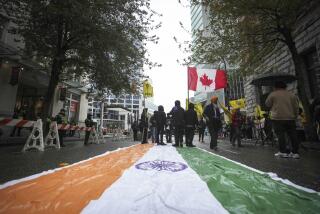Canada Is Shaken by Impending Trials of 6 Soldiers in Somali Death
- Share via
TORONTO — The approaching trials of six Canadian soldiers charged in the death of a Somali civilian are casting a pall over this country’s peacekeeping activities, at a time when the U.N. effort in Somalia is meeting increasing resistance in the United States.
The courts-martial, scheduled to begin later this month, mark the first time that Canadian soldiers have been charged with torture while serving with U.N. forces. Not since 1974 has a Canadian peacekeeper been charged with murder.
Normally, Canada and its army pride themselves on squeaky-clean reputations internationally. But an investigation has revealed that the Canadian deployment to Somalia was plagued from the outset with racial and disciplinary problems--problems not limited to the men on trial. A special board of inquiry has uncovered a rebellious, white-supremacist cell within the Canadian army, in the very unit that was sent into closest contact with Somalis.
Witnesses appearing before the five-member board have testified that racists were “everywhere you look(ed)” in the unit and that one soldier even boasted that he had gone overseas “to kill me” a Somali.
Besides the Somali civilian whose death provoked the courts-martial, three other Somalis have died in encounters with Canadian peacekeepers.
Compounding the scandal, one of the soldiers charged tried to hang himself and is still in the hospital, suffering from severe, long-lasting injuries. His mother has told Canadian journalists that she suspects the apparent suicide attempt was really attempted murder; the Canadian military has rejected that assertion.
In September, the lieutenant colonel who commanded the regiment in question in Somalia was relieved of his duties and given a desk job in Montreal. The military says the reassignment does not reflect any wrongdoing but was made to avoid any appearance of a conflict of interest while the investigation and courts-martial are in progress.
All these disturbing, and most un-Canadian, revelations have called into question the way Ottawa selected and prepared its soldiers for Somalia duty, and have left Canadians wondering how widespread the military racism and insubordination really were. (Canadian troops are no longer serving in Somalia.)
Criticism has also been trained on Prime Minister Kim Campbell, who was defense minister at the time. News about the killings and the Canadian involvement was disclosed only late and reluctantly. Opposition parties are charging a cover-up. Campbell has blamed the initial silence about the incidents on innocent communication breakdowns.
The troubles for Canada began last March, when Shidane Abukar Arone, 29, a Somali civilian, was arrested after he tried to break into the Canadian military compound in the town of Belet Huen. Canadian authorities assume Arone wanted to steal supplies. A few hours later, Arone was found beaten unconscious in a holding cell operated by the Canadians. He was dead on arrival at the compound’s clinic.
The Canadian military sent a terse news release about the death to Mogadishu, the Somali capital, but not to any news organizations in Canada. Since no Canadian journalists were in Mogadishu at the time, the incident went unreported.
It came to light only later, and by chance, when a small-town Canadian journalist on what was intended to be a pro-military press junket to Somalia happened to hear that a soldier had attempted suicide. He pressed for more information, discovered the soldier had been charged with murder and broke the story about Arone.
Not long after that, word leaked out that another Somali had been killed, “execution-style,” by the Canadian troops. The second victim, also killed in March, was shot as he tried to sneak through the Canadians’ barbed-wire perimeter fence at Belet Huen.
With public concern about the Somali violence mounting, then-Defense Minister Campbell last April called for a full investigation. The board of inquiry released its preliminary findings in August, noting that it would not be able to complete its work until after the courts-martial--sometime in 1994.
The investigators homed in on an elite, 120-soldier unit of the Canadian Airborne Regiment called the 2nd Commando Unit. It reported that members of the unit sported white-supremacist tattoos on their arms, called themselves “the Rebels” and rallied around the U.S. Confederate flag.
The Rebels were fond of drinking and carousing, and once, while still in Canada, they set fire to an officer’s car when he tried to clear them out of a bar.
Membership in the white-supremacist cell was limited, but the investigators found that even disapproving non-members were unwilling to snitch on the Rebels.
So serious were the discipline problems in the 2nd Commando Unit that the commanding officer advised against sending it to Somalia at all. He was overruled.
Once in Somalia, the Canadian soldiers often resorted to racial slurs when referring to the Somalis.
Though shocked about the racism, some Canadians say the blame also lies with the difficult and thankless nature of U.N. peacekeeping missions in general. “A lot of people think (the Somalis) were saying, ‘Please help, please help, please help,’ and then when we helped we were looked upon as tyrants,” said one military spokesman.
More to Read
Sign up for Essential California
The most important California stories and recommendations in your inbox every morning.
You may occasionally receive promotional content from the Los Angeles Times.













